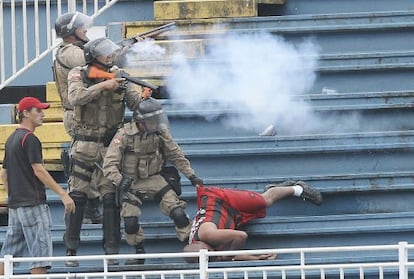Violence mars World Cup plans
Fears grow ahead of Brazil finals after four hospitalized in pitched battle

With six months to go until the World Cup, Brazil is once again having to allay fears that the finals will be marred by violence after a pitched battle between fans of Atlético Paranaense and Vasco de Gama at the weekend that left four people in hospital. “This violence goes against everything that soccer stands for, a sport of passion but also of tolerance,” President Dilma Rousseff said. But this is hardly an isolated incident: just this year 30 people have been killed in stadium violence. Since the authorities started official records in 1984, 234 people have died in clashes between fans.
Such is the concern that Fifa has issued a statement assuring traveling supporters that these scenes will not be repeated at the World Cup: “A very expansive security operation has been set up, with public and private input, to ensure the safety of fans, players and other participants,” the governing body said.
The fight occurred at the Arena de Joinville stadium, where Atlético had been forced to play due to previous crowd trouble at its regular ground of Arena da Baixada in Curitiba, where Spain is scheduled to play Australia in the World Cup. Iron bars were employed and a helicopter had to be deployed on the field to restore order. The Brazilian police remained outside the stadium, which was being monitored inside by a private security firm.
“The stadium isn’t safe,” said Vasco goalkeeper Alessandro.
“With six months to go this is pretty ugly for the country,” noted Valencia’s Brazil forward Jonas.
Mauricio Murad, a sociologist and author of a book on soccer violence, believes this is a new phenomenon. “Something has changed, and for the worst,” he said. “For the last five or six years there was no violence in the stadiums, just outside.”
Atlético Paranaense had foreseen the trouble and announced on a fans’ internet forum that tickets for the game would not be sold to women and children “because of the high risk of conflict.” Despite the warning, police were not stationed inside the stadium. The Military Police said they had assigned 113 officers to reinforce stadium security but these were stood down by a judicial order that prevents the force from participating in private events.
Rousseff took to the social networks to condemn the violence and suggested the creation of a “fans’ prison” to prevent further incidents. “In this country of soccer we cannot coexist with violence in the stadiums. The police must be inside the grounds and prison sentences given to those who commit violent acts.”
Punishment for soccer violence is light: clubs are normally given a stadium ban of three or four games. An initiative put forward by some organizations asking known hooligans to voluntarily present themselves at jail before games has failed to prosper.
Tu suscripción se está usando en otro dispositivo
¿Quieres añadir otro usuario a tu suscripción?
Si continúas leyendo en este dispositivo, no se podrá leer en el otro.
FlechaTu suscripción se está usando en otro dispositivo y solo puedes acceder a EL PAÍS desde un dispositivo a la vez.
Si quieres compartir tu cuenta, cambia tu suscripción a la modalidad Premium, así podrás añadir otro usuario. Cada uno accederá con su propia cuenta de email, lo que os permitirá personalizar vuestra experiencia en EL PAÍS.
¿Tienes una suscripción de empresa? Accede aquí para contratar más cuentas.
En el caso de no saber quién está usando tu cuenta, te recomendamos cambiar tu contraseña aquí.
Si decides continuar compartiendo tu cuenta, este mensaje se mostrará en tu dispositivo y en el de la otra persona que está usando tu cuenta de forma indefinida, afectando a tu experiencia de lectura. Puedes consultar aquí los términos y condiciones de la suscripción digital.









































